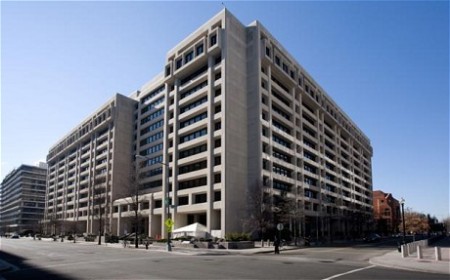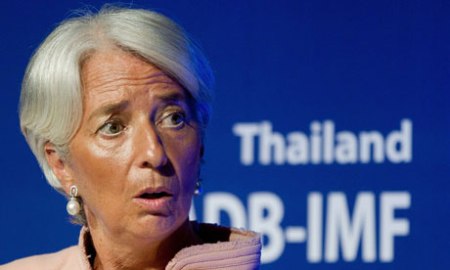September the 11th saw one of the most massive demonstrations for independence ever in the streets of Barcelona. The economic crisis/fraud and the subsequent austerity policies imposed in Spain by the IMF and the European Central Bank have convinced many Catalans that independence from Spain is the only way out, once and for all. In the heat of this discussion taking place at the moment in Spain, the perception among many Spaniards is that they don’t want to see Spain become another “Yugoslavia”. Accurate or not, the problem with this assertion is that it takes into account only the ethnic factor of the Balkan’s war but little is mentioned of the role of IMF austerity packages in the war, the same IMF that is imposing austerity measures in Spain, the same austerity measures imposed in Yugoslavia prior to the war!. It is not my intention to argue that Catalans might provoke a bloodbath in Spain if persisting in their legitimate path for independence, ignoring the larger economic and political picture. Rather, I’d like to highlight the irresponsibility of IMF’s policies when bringing countries to the point of economic desperation. The Catalan move for independence is more than a merely ethnic or cultural caprice as many Spaniards believe and argue but Catalans need to understand as well that a hypothetical independence will not occur in a political and economic vacuum; many geo-strategic interests are at stake here.
Experimenting with human lives: the IMF’s shock therapies in former Yugoslavia and Spain.
At a first glance, comparing the ethnic war in the Balkans and the current situation in Spain might sound exaggerated and out of place to some readers. Are there really any bases for comparison? Is the author trying to suggest a similar violent outcome to the social and economic tensions created in Spain that the packages of structural adjustment are exacerbating? It’s certainly obvious that the present economic crisis in Spain and the Balkan’s war bear little resemblance except for the fact that both Yugoslavia and Spain are multicultural mosaics embracing a number of different national and cultural sensibilities held together by an authority, namely, King Juan Carlos de Borbon in Spain (who succeeded the iron fist of dictator Francisco Franco) and Mariscal Tito in ex-Yugoslavia. Spain and ex-Yugoslavia do not even share the same religious diversity as Spain is mostly and overwhelmingly a Catholic country whereas ex-Yugoslavia had (and still has) three main religions, Eastern Orthodox, Roman Catholic and Muslim. In terms of geography and history, it is clear that, apparently, neither Spain nor ex-Yugoslavia share much in common. Perhaps the linguistic diversity of both countries might live up to this comparison as Spain is as multilingual (Catalan, Basque and Galician are official languages in Spain) as ex-Yugoslavia, where Serbian, Croatian and Bosnian are now official national languages. So, what is the point in writing a piece that compares two countries (one of which does not exist anymore as such) that do not share much historically, economically and culturally except for the fact that both are (or have been, in the case of ex-Yugoslavia) multilingual and multicultural nations united by a strong uniting force? Certainly, and as some members of the Clinton administration advised in the roaring 90’s, “it’s the economy, stupid!”. But why the economy? We must move beyond the focus of the Western press, which portrayed the ethnic conflict in Yugoslavia during the 90’s as the consequence of merely aggressive nationalism, occluding the important role of the IMF in breaking up the Yugoslav federation. This is the same IMF that will probably “rescue” Spain with a credit of 100.000 million euros only to save its bankrupt banks, or so the Spanish government says….
The intervention of the IMF in former Yugoslavia can be seen as part of a general geostrategic plan to establish neoliberalism as the hegemonic economic system in the world, which began to really take shape after the fall of the Berlin Wall and of Communism at the end of the 80’s. Yugoslavia played a crucial role in this global strategy from the moment that Mariscal Tito promised love to the Soviet Union while winking an eye to the US investment in the 50’s. Perhaps it was in this ambivalence where the IMF found a small crevice to penetrate the country after the 70’s economic crisis, imposing a package of structural adjustment to reconfigure the country’s institutions towards a market-oriented economy. Until that moment, the economy of ex-Yugoslavia had experienced a rapid agricultural and industrial growth between 1957 and 1960, being one of the fastest growing economies in the world and it continued well into 70’s despite the economic crisis:
“Multiethnic, socialist Yugoslavia was once a regional industrial power and economic success. In the two decades before 1980, annual gross domestic product (GDP) growth averaged 6.1 percent, medical care was free, the rate of literacy was 91 percent, and life expectancy was 72 years. But after a decade of Western economic ministrations and a decade of disintegration, war, boycott, and embargo, the economies of the former Yugoslavia were prostrate, their industrial sectors dismantled”.
But this impressive economic success was accompanied as well by a remarkable social success. Until the implementation of the first IMF package of structural adjustment measures in early 80’s, ex-Yugoslavia enjoyed free medical care, a literacy rate above 91% and a life expectancy of 72 years. The first phase of IMF experimentation in Europe was about to be implemented. Objective?. The weakening of the Iron Curtain to grant capitalism a spacious highway into communist territory. And of course, nothing is more abhorring for a neoliberal monk than a territory full of social obstacles to the Almighty (and voracious) God of economic profit where wages are economically competitive in the international market. The IMF package of structural adjustment imposed on former Yugoslavia during the 80’s must sound strangely familiar to Spanish: wage freeze (in Spain wages of public sector workers have been literally slashed), the dismantling of the industrial sector, sharp cuts in public spending, and the dismantling of the welfare state, all this only to repay international creditors of the IMF. But what will probably startle the Spanish reader is to know that these austerity measures were pivotal in the exacerbation of secessionist movement and the terrible ethnic strife that ensued such economic reforms. Like Spain, former Yugoslavia was formed by a number of republics (autonomous communities in Spain) with an industrialised north in Croatia and Slovenia (Catalonia and the Basque Country in Spain), and a mostly agricultural south in Bosnia, Kosovo and Macedonia (Andalucía, Murcia, Extremadura and Castilla la Mancha in Spain). Interestingly, tensions between northern industrial-oriented republics and southern agriculturally-oriented ones built up in Yugoslavia as its IMF controlled central bank imposed severe lending restrictions which basically led the economy of the federation to a halt. Such was the outcome of the IMF’s designed shock therapy that it became impossible for Belgrade to obtain state revenues for the republics as most of the budget was redirected to the repayment of the debt contracted with the IMF. Little by little, the republics were left on their own to compete for the scarce remaining resources, when the budget supplies that had connected financially Belgrade to the republics were severed. The rest is tragic history in the Balkans, as Jude Wanniski clearly points out in a memo to Secretary of State Madeleine Albright:
“Ordinary people turned into ethnic monsters only after all their options for economic life were destroyed. Ethnic cleansing came arrived only after shock therapy had done its work”.
So, the IMF had a crucial role in the breaking up of the Yugoslavian federation through the imposition of drastic structural adjustment reforms that ended up sparking social discontent and breeding ethnic hatred, as the recently declassified Wikileaks documents state: “Do not forget, the IMF austerity measures imposed on Yugoslavia were in part to blame for the start of the war there. We need to be aware of any economically motivated social discontent”. Like former Yugoslavia, Spain enjoyed a decent welfare state built after the death of Franco. In 1982, the election of the Spanish Socialist Party (PSOE) initiated a period of soft neoliberal policies and openness to multinationals, combined with a moderate increase in public spending (25% of GDP, slightly below the European average of 28.5% and well below Finland’s public spending of up to 35% in the mid 80’s), particularly in public education and public health, a mini welfare state. After almost a decade of increasing neoliberalisation and inequality and an economic bubble caused by the passing of the “Ley del Suelo” or “Building Land Law” in 1998 (implemented by former right-wing Spanish president Jose Maria Aznar), which basically eliminated all restrictions to house building, the right to have a house became a luxury in the hands of speculators. Mortgages were issued at 35 or 40 years and prices kept going up as almost everybody was entitled to buy a house. But when prices could not rise any longer and therefore house development ceased to be a lucrative business, speculators moved their money elsewhere and after that real state agencies could not return the money to the banks and banks were not issuing any more credit to buyers. The construction bubble exploded leaving aside a desolate landscape raided by the greed of rampant corruption. The consequences of this crisis/fraud in Spain have been disastrous as most of the economic tissue of the nation centred almost exclusively on the construction sector: overnight, electricians, plumbers, carpenters, architects found it very hard to find jobs whilst a small elite of corrupt politicians had grabbed indecently enormous benefits from EU funds channelled through the state. A staggering 25% unemployment (50% of which corresponds to youth between 18 and 25 years old) bleeds a country where the old and new oligarchy of the right wing PP feels at ease in an old new scenario of inequality very similar to the pre-republican era of the beginning of the 19th and mostly 20th centuries (except the oasis of the 2nd Republic).
At this point, the economic and political situation does not differ much from that in former Yugoslavia before its dismantling: a deep economic crisis/fraud, Spain on its knees, the application of shock therapy via debt and structural adjustment programs, the dismantling of the welfare state and the disintegration of the nation? Again, the IMF’s “rescue” of former Yugoslavia after the crisis of the 70’s should resonate powerfully here. In very little time, Spain woke up from the dream of economic buoyancy into the nightmare of the IMF’s shock therapy. It has been a rude awakening for many Spaniards after years of relative social cohesion and moderate welfare. As we have seen in countless other countries and especially in former Yugoslavia, the recipe of the IMF to bring the “dead” back to life is an economic program of brutal austerity, the slashing of public sector-funded programs and the massive privatisation of public services. Rather, these austerity measures will disfigure the entire thousand years-old socio-cultural and economic tissue of a nation, and will turn Spain into an eternal slave of debt.
After the dismantling of the welfare state, the next step is the dismantling of the political tissue of the country, as in former Yugoslavia. In the context of the austerity measures and structural adjustment program imposed on Spain by the Troika for the last three months, the chief of this economic institution recently “suggested” the Spanish government to apply the stick (instead of the carrot) with the regions that incur into violation of the “Ley de Estabilidad Presupuestaria” (Law of Budget Stability). This new law basically establishes 11 points aimed at disciplining the public spending of both public administrations and regions through a spending limit. In a meeting recently held in Madrid, the representatives of the Andalusian government (the southern and poorer region in Spain governed by the Socialist Party) found the impositions utterly unacceptable as their fulfilment would imply the closing down of hospitals and schools if such spending limits are to be met. The reaction of the Catalan government was also of utter rejection and Andreu Mas-Colell (the Catalan finance councillor) refused to attend the meeting. If the government does not pull back on these severe restrictions (and it will certainly not pull back), nationalist and separatist sentiment will inflame all the regions, but especially those regions with a distinctive historical and cultural background (Catalonia, the Basque Country, Galicia, and even Andalucía, where a feeble separatist sentiment still survives). I am witness myself to this increasing passion for secession in those regions where the historical perception of Spain as the source of all problems (and the other way round) is aggrandizing day by day. As I read the main online Catalan newspapers I cannot help thinking that for an increasing number of Catalans, this economic crisis and the Law of Budget Stability is not only a historical opportunity to once and for all fulfil their economic and cultural aspirations, but also a seemingly rational and logical solution to finish what is strongly perceived in Catalonia as the Spanish plundering of its economic budget. And if Catalonia pulls towards independence the chances are the Basque Country (and possibly many other regions) will follow suit as the Spanish central government severs the economic arteries that connect centre and periphery, and peripheral regions see themselves forced to live off their now scarce resources.
In this possible scenario, I foresee the centrifugal force of each autonomous region demanding their own fair share of independence not only against the Spanish central government but also against other autonomous regions. In this way, the Spanish political architecture on which its social and political cohesion would begin to crumble as the unifying force of the nation, the Spanish Crown, loses its legitimacy to the eyes of Spanish and Catalan citizens: how are they supposed to understand the dismantling of the welfare state (with all its terrible consequences) and the acceptance of “sacrifices” to overcome the economic crisis/fraud while the Spanish Royal family costs around pounds a year and the church does not pay taxes? Needless to say, the King’s 30,000 euros hobby of elephant hunting in Botswana does not precisely rises waves of applause among beleaguered Spaniards. And remember, the disintegration of the former Yugoslavian federation accelerated when Mariscal Tito, the iron fist that balanced the precarious balance between Belgrade and the republics, died in 1980. It’s difficult to tell whether the absence of King Juan Carlos in the future would trigger a similar uncontrollable array of secessionist forces and chaos in such a problematic scenario of political uncertainty, but
The IMF package of structural adjustment and brutal austerity measures would not certainly be the agent provocateur of a hypothetical fragmentation of Spain but, as it did in former Yugoslavia, would considerably accelerate the breaking up of a delicate balance that has allowed Spain and its regions to at least coexist more or less respectfully after Franco’s brutal suppression of Spain’s multinational mosaic. The constitution of 1978 recognised, for the first time in many years of history, that Spain was a culturally and linguistically plural country (article 3.2), and introduced as well a new territorial organisation of the state with three levels of government: the central government, 17 autonomous regions and local councils. In this scheme, autonomous regions have enjoyed a decent amount of organisational autonomy despite the asymmetric logic of resource distribution. So Spain swerved from a totally centralised government with minimal protagonism for regional actors, to a decentralised state after Franco’s death.
Both Spaniards and Catalans need to stop buying the nationalist discourse of the centre and the periphery (which represent the interests of the Madrid and Barcelona economic oligarchies), and begin to articulate a rational and profound debate about the structure of the nation from the depths of grassroots social movements, from the people, just like the demonstration of 11th September was organised by the Catalan National Assembly, a non-partisan grassroots organisation. Spain will only learn to live without territorial tensions once it begins to understand and promote its own national diversity as part of its inherent richness. Unfortunately, the last movements for economic centralisation made by the Spanish government (and imposed by the IMF) bring Spain closer to Franco’s regime than to the political emancipation demanded by social movements and in this context, secession might look inevitable.
Sources
Mary Shelley, Frankenstein, chapter 20, http://ebooks.adelaide.edu.au/s/shelley/mary/s53f/chapter20.html
David Harvey, The Enigma of Capital and the Crisis of Capitalism, Profile Books, 2011, pp.19-56.
David Harvey, The Condition of Postmodernity. An Enquiry into the Origins of Cultural Change, Malden, Mass.; Oxford: Blackwell, 1990, p. 244.
Ibid. 242.
Fredric Jameson, “Cognitive Mapping”, in Poetics/Politics: Radical Aesthetics for the Classroom, Amitava Kumar (ed.), New York: St. Martin’s Press, 1999, p.157.
Jacques Derrida, Spectres of Marx: The State of the Debt, the Work of Mourning and the New International, London, Routledge, 1994, p. 13, 88.
Albert Gelpi, “The Genealogy of Postmodernism: Contemporary American Poetry”. http://www.writing.upenn.edu/~afilreis/88/gelpi.old
Alex Andreou, “Exploding the myth of the freckless, lazy Greek”, http://www.newstatesman.com/blogs/world-affairs/2012/05/exploding-myth-feckless-lazy-greeks
Zygmunt Bauman, Globalization: the Human Consequences, Cambridge, Polity Press, 1998, p. 26.
Global Issues, http://www.globalissues.org/article/3/structural-adjustment-a-major-cause-of-poverty
According to Wikipedia, the phrase was coined by campaign strategist James Carville for Bill Clinton’s 1992 presidential election.
Centre for Research on Globalisation, “Economic War Crimes: Dismantling Former Yugoslavia, Re-colonizing Bosnia-Herzegovina”, http://www.globalresearch.ca/articles/CHO202G.html
Jude Wanniski, “The IMF and the Balkan Crisis”, http://www.polyconomics.com/index.php?option=com_content&view=article&id=2563:the-imf-and-the-balkan-crisis&catid=38:1999&Itemid=30
Wikileaks, The IMF’s Fault for the Balkan War, http://www.balkaninsight.com/en/article/wikileaks-the-imf-s-fault-for-balkan-war
Ibid.
Carlos Segovia, “El mini estado del bienestar Español”, http://www.elmundo.es/elecciones/temas/pension/pensi-03.html and Vicenc Navarro’s “El porque de los recortes”, in Diario Publico http://blogs.publico.es/dominiopublico/5499/el-por-que-de-los-recortes/
Expansion newspaper, http://www.expansion.com/2012/07/27/economia/1343402985.html?a=e436d83de6a1bcc2a35215c9e1061b44&t=1344113373
The Spanish Constitution (English version), http://www.senado.es/constitu_i/indices/consti_ing.pdf
Declaration of Fundamental Rights. Text adopted by the European Parliament, Wednesday 12, April 1989, http://www.europarl.europa.eu/charter/docs/pdf/a2_0003_89_en_en.pdf


